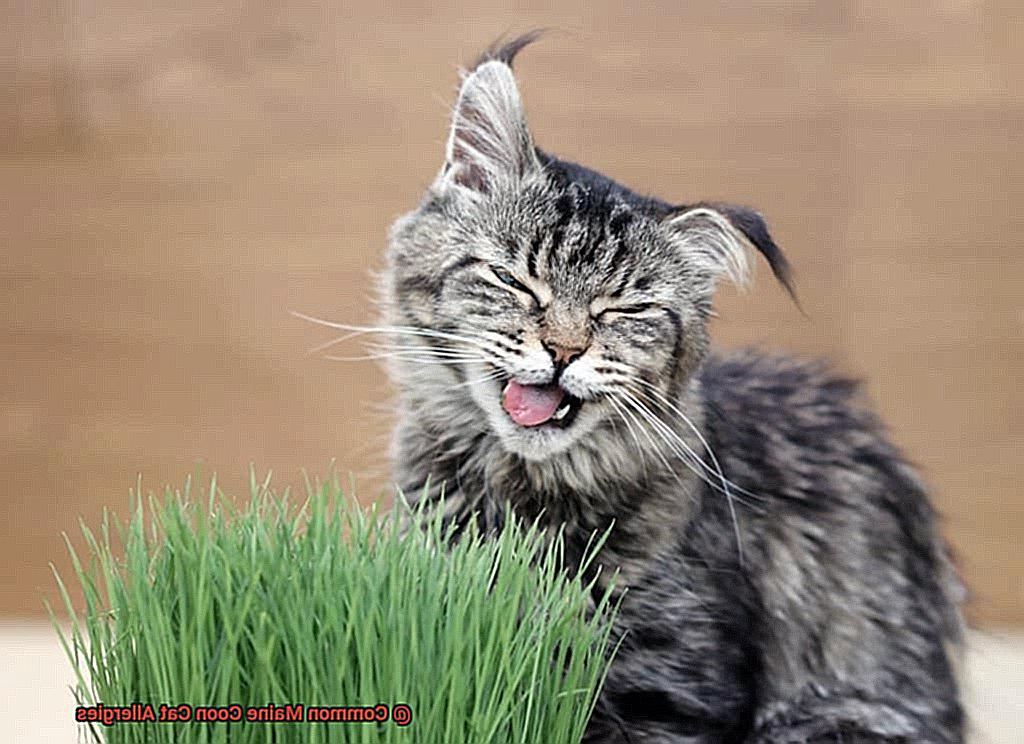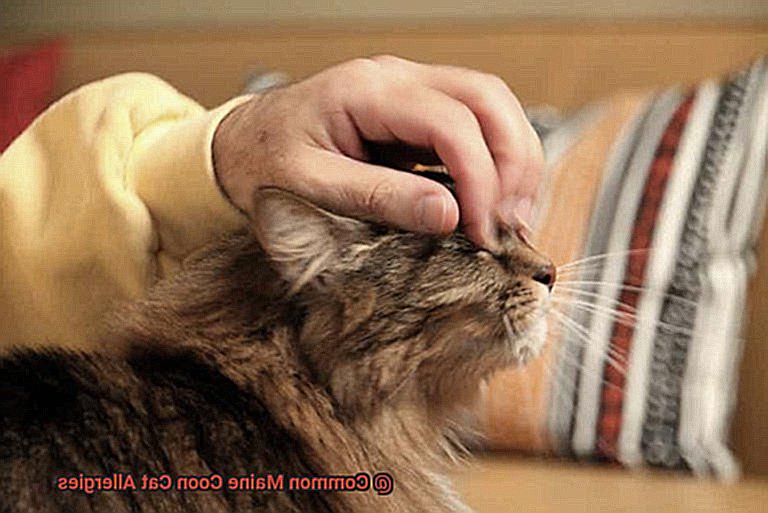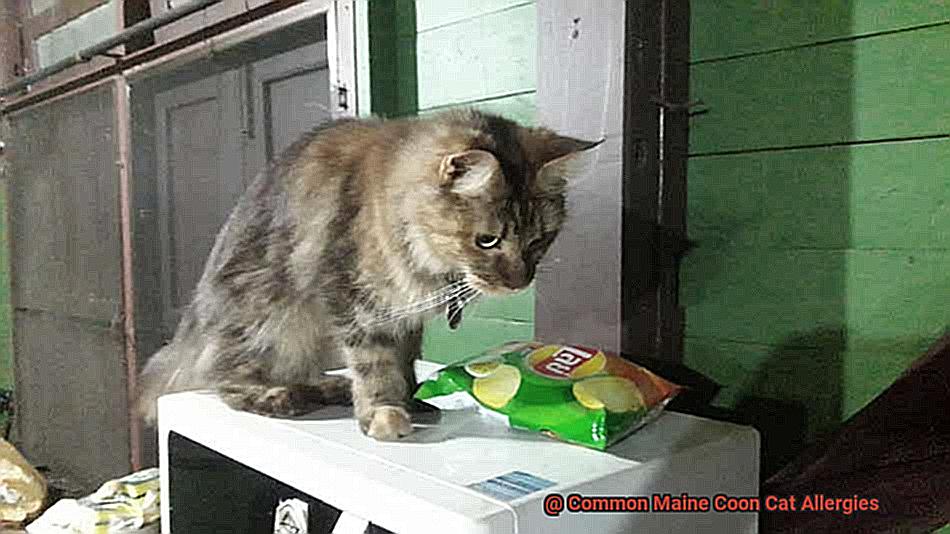Maine Coon cats are more than just a pretty face. They’re known for their playful personalities, loyalty, and affectionate nature – making them the perfect furry companion for many households. But what if you’re one of the unlucky ones who suffer from allergies?
Allergies are a common ailment that affects up to 30% of the population at some point in their lives. But did you know that Maine Coon cats can also be prone to allergies? These allergies can cause discomfort and even serious health problems for both your pet and yourself.
In this post, we’ll dive into the most common Maine Coon cat allergies and how they affect your feline friend. We’ll cover everything from symptoms to look out for, tips on managing allergies, and ways to ensure your Maine Coon has a comfortable life.
Whether you’re a Maine Coon owner struggling with allergies or simply curious about this topic, keep reading to get all the answers.
What are Common Maine Coon Cat Allergies?
Maine Coon cats are beloved for their playful personalities, stunning looks, and affectionate nature. However, these adorable felines are also prone to allergies, just like any other pet. As a responsible cat owner, it’s important to be aware of the common Maine Coon cat allergies to ensure that your feline friend stays healthy and content.
The three most prevalent types of allergies in Maine Coon cats are flea allergy dermatitis, food allergies, and environmental allergies. Flea allergy dermatitis in Maine Coon cats happens when they become allergic to flea saliva. Even a single flea bite can cause intense itching, hair loss, scabs, and skin infections. Treatment involves removing fleas from the cat’s environment and using medications to alleviate discomfort.
Food allergies in Maine Coon cats are triggered by specific proteins found in their diet. Symptoms include vomiting, diarrhea, itchy skin, and ear infections. Treatment involves eliminating the allergen from the cat’s diet and replacing it with hypoallergenic food.
Environmental allergies are caused by substances present in the environment such as pollen, dust mites, or mold spores. Symptoms of environmental allergies include sneezing, watery eyes, itchy skin, and ear infections. Treatment may involve avoiding the allergen if possible or using medications such as antihistamines or steroids to control symptoms.
It is crucial to identify the type of allergy your Maine Coon cat is experiencing to provide proper treatment. Consult with your veterinarian immediately if you suspect that your cat has an allergy. They can conduct tests to determine what’s causing the allergic reaction and recommend an appropriate treatment plan. Treatment options for Maine Coon cat allergies include dietary changes, antihistamines, corticosteroids, and immunotherapy.
Flea Allergy Dermatitis

FAD is a skin condition that occurs when cats are allergic to the saliva of fleas. When fleas feed on their blood, they leave behind saliva, leading to an itchy and painful reaction on the skin.
The symptoms of FAD can be distressing for both you and your furry friend. Excessive scratching and biting, hair loss, redness, and scabbing on the skin are all signs that your Maine Coon cat may be suffering from FAD. If left unchecked, it can lead to secondary infections and other complications.
Fortunately, preventing FAD is simple with regular flea control measures. By using flea preventatives recommended by your veterinarian and regularly washing your cat’s bedding and other areas where fleas may hide, you can help prevent the onset of FAD.
If your Maine Coon cat is already suffering from FAD, there are a variety of treatment options available. Topical or oral medications can help alleviate symptoms and prevent further infection. However, it’s essential to consult with your veterinarian for proper diagnosis and treatment.
Food Allergies
Your Maine Coon cat is more than just a pet – they’re a beloved member of your family. Unfortunately, even the most pampered cats can develop food allergies, which can be a source of worry and discomfort for both you and your feline friend. In this post, we’ll explore the causes, symptoms, diagnosis, and treatment of food allergies in Maine Coon cats, so you can help your furry companion stay healthy and happy.
Food allergies occur when a cat’s immune system reacts to certain proteins found in their food. Common allergens include beef, fish, chicken, and dairy products. If your Maine Coon cat is allergic to any of these proteins, they may experience symptoms such as vomiting, diarrhea, skin rashes, and itching – not exactly pleasant experiences for either of you.
In severe cases, your cat may even experience anaphylaxis – a life-threatening reaction that requires immediate veterinary attention. So if you suspect that your feline friend is suffering from a food allergy, it’s essential to take them to the vet for a proper diagnosis.
Your veterinarian may recommend an elimination diet to identify the specific allergen causing the reaction. Once you’ve pinpointed the culprit allergen or allergens, you can eliminate it (or them) from your cat’s diet. However, it’s worth noting that some cats may have multiple food allergies that can take time to identify.
To prevent future allergic reactions, make sure you read the labels on any cat food you purchase and avoid any products that contain known allergens. You can also try feeding your Maine Coon cat a hypoallergenic or limited-ingredient diet that contains novel proteins they haven’t been exposed to before. This approach can help reduce the risk of future allergic reactions.

Environmental Allergies
There are ways to manage these pesky allergies and keep your furry friend feeling their best.
Environmental allergies in Maine Coon cats are often caused by common irritants such as dust, pollen, and mold. Identifying the source of the allergen is crucial in managing these symptoms. Once you pinpoint the culprit, you can take steps to eliminate it as much as possible. This includes keeping your cat’s environment clean and free from allergens by regularly washing bedding, vacuuming carpets, and using an air purifier to clean the air.
If your cat is still experiencing symptoms despite your best efforts, it may be time to consult with a veterinarian. They may prescribe antihistamines or steroids to help alleviate symptoms. However, it is essential to remember that these medications can have side effects and should only be given under the guidance of a veterinarian.
In addition to traditional medication, there are natural remedies that can help soothe your cat’s discomfort. For instance, adding omega-3 fatty acids to their diet can help reduce inflammation in the body. Herbal remedies such as chamomile or calendula can also aid in soothing irritated skin.

Managing environmental allergies in Maine Coon cats requires a combination of identifying and eliminating allergens in their environment, working closely with a veterinarian to manage symptoms, and exploring natural remedies to alleviate discomfort. By taking proactive steps to care for your cat’s allergies, you can provide them with the best possible quality of life.
Symptoms of Common Maine Coon Cat Allergies
Identifying the symptoms of common Maine Coon cat allergies is the first step towards managing them and still enjoying the company of your furry friend.
So what are some of the tell-tale signs of Maine Coon cat allergies? Well, one of the most common symptoms is sneezing. If you find yourself sneezing frequently around your cat, it’s possible that you have an allergy. Another symptom may be watery or itchy eyes, which can lead to redness, puffiness, and general discomfort.
In addition to sneezing and watery eyes, people with Maine Coon cat allergies may also experience a runny nose or congestion. These symptoms are all caused by the body’s immune system reacting to allergens produced by the cat. In more severe cases, coughing and wheezing can also occur or even skin irritation if there’s direct contact with the cat’s fur.
It’s important to note that the severity of these symptoms can vary from person to person. Some people may only experience mild reactions while others may have more severe ones. Therefore, if you suspect that you or a family member has a Maine Coon cat allergy, it’s important to visit a doctor for proper diagnosis and treatment options.
But don’t let allergies keep you from enjoying your beloved pet. There are several ways to manage allergies caused by Maine Coon cats. For example, identifying and eliminating common irritants like dust, pollen, and mold can help reduce allergy symptoms. Consult with a veterinarian for medication or natural remedies like omega-3 fatty acids or chamomile to soothe irritated skin.

Treatment for Common Maine Coon Cat Allergies
There are several options available to help you control your allergies and live comfortably with your beloved pet.
First things first, identifying the specific allergen causing your symptoms is crucial. Blood tests and skin prick tests can help determine the culprit, allowing you to take steps to avoid exposure. However, let’s face it – avoiding the allergen altogether is often easier said than done, especially when it comes to pets like cats.
Fortunately, antihistamines can provide relief by blocking the histamine response in your body to allergens. Whether you’re dealing with itching, sneezing or other uncomfortable symptoms, antihistamines can help alleviate them.
In more severe cases, immunotherapy may be necessary. This treatment involves gradually introducing small doses of the allergen to your cat over time, allowing their immune system to build up a tolerance. While this approach may take several months or even years to be effective, it can significantly reduce or even eliminate allergic reactions in some cases.
In addition to medical treatments, lifestyle changes can also help manage cat allergies. Keeping your cat out of certain rooms or areas of the house that you frequent, regularly washing bedding and other fabrics that may harbor allergens, and using air purifiers to remove allergens from the air are all simple but effective solutions.
It’s important to work closely with a veterinarian or allergist when treating cat allergies because they can provide guidance on the best course of treatment for your specific situation. With proper treatment and management, many people with cat allergies are able to live happily with their Maine Coon cats.
kfBdAo1GSVg” >
Conclusion
In conclusion, Maine Coon cats are more than just furry companions – they’re members of the family. However, they can be susceptible to allergies, just like any other pet. Flea allergy dermatitis, food allergies, and environmental allergies are the three most common types of allergies that affect Maine Coon cats.
From sneezing and watery eyes to vomiting, diarrhea, and itchy skin – allergic reactions can vary in severity. It’s crucial to identify the type of allergy your cat is experiencing and seek proper treatment from a veterinarian.
Preventing fleas with regular flea control measures is key in managing flea allergy dermatitis. For food allergies, an elimination diet can help identify the allergen causing the reaction. Environmental allergies may require identifying and eliminating allergens in the cat’s environment and using medication or natural remedies to alleviate symptoms.
Treatment options for Maine Coon cat allergies include dietary changes, antihistamines, corticosteroids, immunotherapy, and lifestyle changes such as keeping the cat out of certain rooms or areas of the house.
Don’t let allergies come between you and your beloved pet. With proper treatment and management, many people with cat allergies are able to live happily with their Maine Coon cats.







